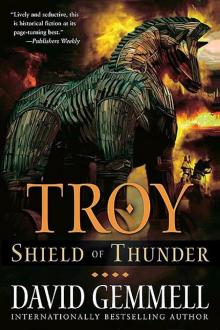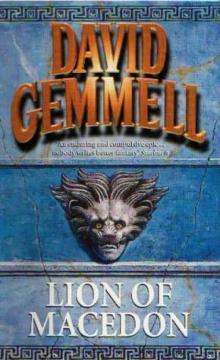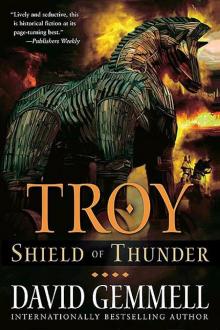- Home
- David Gemmell
Fall of Kings Page 14
Fall of Kings Read online
Page 14
Odysseus looked shocked. His face was gray, and there was sweat on his face. He looked into Achilles’ eyes and sighed. “There is word of your father’s battle with Hektor,” he told the warrior.
Achilles could tell from his expression that the news was not good. “Is he dead?”
“Yes. I am sorry, lad. Hektor destroyed him and his army at a place called Carpea.”
Odysseus fell silent. Achilles looked away, staring out over the night sea.
“I feared this,” he said softly. “I tried to warn him, but he was hungry for glory. Did he die well?”
Odysseus shrugged. “I did not hear all the details. But you must get back. King Gadelos is still neutral. Tomorrow we will see if he can spare a galley to take you north.”
“You will not be returning with me?”
Odysseus shook his head. “There was other news, Achilles. I must return to Ithaka immediately.”
He looked into the ashen face of the old king and knew then that it was not the death of Peleus that had stunned him. Odysseus seemed to have aged ten years.
“What has happened, my friend?”
“A pirate fleet with several hundred warriors has invaded Ithaka. They have taken my Penelope.”
Achilles said nothing for a moment. His warrior’s mind focused on the problem.
“You have only forty men,” he said. “We must request aid from the Kretan galleys or find willing warriors on the mainland.”
Odysseus shook his head. “The Kretans have orders to patrol the seas around Naxos. Only a direct order from King Idomeneos could change that. And he is far away, fighting near Little Thebe.”
“So you will go against them with but a single ship?”
Odysseus’ eyes blazed. “Penelope is the love of my heart and the light of my life. I will sail at dawn.”
“Then I shall come with you, my friend.”
The older man was touched. Reaching up, he clasped Achilles’ shoulder. “I thank you for that, lad. I truly do. But you are a king now, and your place is at home, not fighting another man’s battles.”
“No, Odysseus, you are wrong. I was a man before I was a king, and no true man walks away when a friend needs him. So no more arguments. I am coming with you.”
Odysseus sighed. “I cannot say that I am not relieved. Very well, then. We sail tomorrow. There is a man I must find who might help us.”
“Is he a warrior with a great army?”
“No,” Odysseus answered. “He is an old pirate named Sekundos.”
CHAPTER TEN
THE BLESSED ISLE
As she had on every evening for forty years, the High Priestess of Thera walked out onto the cliff top in the giant shadow of the Temple of the Horse and watched the sun descend into the sea. In high summer she would view the sunset from directly beneath the great head, but as winter deepened and Apollo’s Arc became more shallow, she would observe it from a sheltered bench, facing southwest.
She smiled as she thought of Apollo’s Arc. Not that she did not believe in the sun god. Far from it. Iphigenia believed in all the gods, most especially the demigod beneath the island, whose fury the temple had been founded to appease and gentle. What made her smile was the myth that golden Apollo climbed into his fiery chariot every day and flew it across the sky, pursuing his errant sister, the virgin Artemis, whose white chariot was the moon. What nonsense. As if two gods would waste their immortality in so fruitless a pastime.
Pain lanced through Iphigenia’s chest, and she cried out and staggered. Her left arm spasmed in an agonizing cramp. She staggered to the bench and collapsed onto it. Reaching into the pouch at her waist, she took a pinch of the powder there, placing it on her tongue. The taste was sharp and bitter, but she swallowed it and sat quietly, taking deep calming breaths. After a while the pain faded, though her arm ached for some time.
In the far distance she saw the tiny dot of a ship moving through the necklace of islands surrounding Thera. During winter ships rarely ventured far on the Great Green, fearing the sudden squalls when Poseidon swam. They certainly did not travel to Thera without an invitation. Yet now two were there: the Egypteian ship and this newcomer.
The Gypptos had arrived the previous day but had offered no reason for their visit. The leader, a lean, hard-faced young man named Yeshua, had sent two barrels of dried fruits as a gift offering and requested permission to remain on the beach for a few days. Iphigenia had granted his wish assuming they had repairs to make to their vessel. A strange craft it was, with its high curved prow and crescent sail. It seemed flimsy against the solidly crafted galleys of Mykene or Kretos.
The aftereffects of pain left Iphigenia feeling cold and nauseous. Wrapping her cloak more tightly around her thin shoulders, she leaned back against the bench. Craning her neck, she looked up at the horse. Even now she could vividly recall her feelings when she first had seen the isle and its monstrous temple. She had been barely fourteen, tall and thin and without the curves that caught men’s eyes. Her failure to attract suitors had left her shy and ashamed, but when Iphigenia had gazed upon the giant horse, she had been filled with a sense of purpose, of destiny.
“Lady!” Her reverie was interrupted by a young priestess with disheveled yellow hair who ran up to her, breathless. “It is the Xanthos! The Xanthos!” The girl was terrified, as well she might be.
Iphigenia looked sternly down at her. “Are you sure, Melissa?”
“Yes, lady. Kolea told me, and she has seen it many times. Kolea is from Lesbos. Her father is an ally of Troy.”
“I know who her father is, foolish girl!”
“I’m sorry, lady. Kolea told me it is Helikaon’s ship. No other ship on the Great Green is that big. Should we hide?”
“Hide?” Iphigenia surged to her feet. “From a murderous brigand? I am Iphigenia, daughter of Atreus the battle king, sister to Agamemnon. You think that I will hide?”
Melissa flung herself to her knees, her forehead to the floor. “Forgive me, lady!”
Pain seared again through Iphigenia’s chest. Biting back a cry of agony, she sat back down and took a second pinch of powder. It was too much, she knew, and the colors of the sunset sky began to dance and swirl. But the pain died down.
“Send Kolea down to greet the Xanthos,” she told Melissa. “Tell her to bring any messages to me immediately.”
She looked out to sea again. The Xanthos was beating its way across the great harbor, passing the black isle in the center. The young priestess hitched her skirt around her knees and ran off toward the jumble of stables and living quarters behind the temple.
“Melissa!” the older woman barked. The girl stopped in her tracks and turned, dust swirling around her bare feet. “Behave with dignity. A priestess of Thera does not run like a frightened peasant. She does not panic.”
The girl flushed. “Yes, lady.” She turned and walked quickly toward the stables.
Iphigenia smiled grimly. She knew how they all saw her: tall and forbidding, her iron-gray hair pulled back fiercely, emphasizing her hawk nose and fierce brows. They could not see beneath the wrinkled, sagging skin the remains of the young priestess who also had run like a colt, intoxicated by this life of freedom and unexpected pleasures. They saw only a woman grown old in the service of the Blessed Isle.
She looked up at the horse. “Well, great stallion, what does this mean? Helikaon the Burner here at Thera. The enemy of my blood and of my house.”
The thought that the Xanthos was on a raid flashed into her mind and was as quickly dismissed. Priam the king was the patron of the isle, and much as she abhorred the man’s excesses, she had to admit he performed the duties of a patron with efficiency, delivering both gold and the power of his protection to the Blessed Isle. If the sanctuary of Thera was lost, both Trojans and Mykene would rue it. All sides knew that. No, Helikaon must be acting as a messenger. She had not expected so early a reply to her embassy. Her heart beat faster. Perhaps she had been successful and Andromache would be lured back to Th
era in the spring.
Her hand to her chest, she relaxed against the bench. Eager though she was to find out why the Xanthos had arrived, she no longer had the strength to walk down to the harbor. That was a problem, since men who landed on the Blessed Isle were permitted no farther than the wooden receiving hall on the black sandy beach. Therefore, she would have to allow the Burner to walk up to the temple or use intermediaries to ascertain his purpose. To allow a man into the temple—especially one as vile as the Burner—would be sacrilege, yet to depend on others with less guile than she would be to risk misunderstanding the true purpose of his visit.
Allowing a man to walk the island was not without precedent. Priam had entered the temple forty years before. Iphigenia had been fourteen then, newly arrived on the isle, and she had looked with curiosity on the virile king and his young queen, a woman of dark beauty and darker ambition.
The priestess placed her hand against the horse’s massive hoof. “You were more impressive back then, my friend,” she said, marveling anew at the skill of the builders. Craftsmen from Troy and Hattusas had built the main block of the temple with limestone, a huge rectangular building with a tower at one end. Then skilled carpenters from Kypros and Athens had shaped oak timbers around it, creating the illusion from a distance of legs, a neck, and a great head. Egypteian artists had traveled to the Blessed Isle, coating the wooden horse with whitewashed plaster and then adding paints and dyes to give it life. Much of the paint was chipped now, and bare timber showed through, cracked and pockmarked. From the sea, though, the white wooden horse still looked magnificent, a massive sentry standing guard over the island.
Rising again and moving to the edge of the cliff, Iphigenia could see that the great galley with its black horse sail had beached below at last. There were men milling about. Soon she would know.
She had been angry when Queen Hekabe had ordered that Andromache be sent to Troy. There was a strength and energy in the girl that never should have been wasted on furthering men’s ambitions. Andromache had been furious. She had stormed into the gathering chamber and confronted Iphigenia.
The priestess smiled fondly at the memory. Green-eyed Andromache feared her, just as all the other women there did. But such was the strength of her spirit that she could, and often did, conquer that fear and fight for causes she believed in. Iphigenia had admired Andromache for her stand on that day. Closing her eyes, she pictured the angry young priestess. Her lover Kalliope had been standing close by anxiously, her eyes downcast.
Andromache had refused to leave Thera, and Iphigenia had tried to explain how the circumstances were special.
“Special?” Andromache stormed. “You are selling me for Priam’s gold! What is special about that? Women have been sold since the gods were young. Always by men, though. It is what we come to expect from them. But from you!”
And that had hurt, like a dagger deep in her belly. Iphigenia had fought for decades to keep Thera safe and independent from the powers of kings. Sometimes it required steadfast courage, but often it needed compromise.
Instead of seeking to dominate Andromache and cow her into submission, Iphigenia had spoken softly, her words full of regret.
“It is not just for Priam’s gold, Andromache, but for all that gold represents. Without it there would be no temple on Thera, no princesses to placate the beast below. Yes, it would be wonderful if we could ignore the wishes of powerful men like Priam and do our duty here unmolested. Such freedom, however, is a dream. You are a priestess of Thera no longer. You will leave tomorrow.”
Andromache had not argued further. It showed that she had grown in wisdom in her two years on the Blessed Isle and was beginning at last to grasp the need for such compromises.
Andromache probably would not show such understanding when she returned to Thera in the spring, Iphigenia knew. She would be furious when she discovered the betrayal. But her fury was as nothing when set against the needs of Thera. The security of the temple was vital, more important than any single life.
At last she heard the snorting of donkeys and the clink of bridles. Iphigenia eased herself up and moved to the cliff edge. Below she could see three figures on donkeys slowly climbing up the winding path from the harbor. The priestess Kolea led the way. She had turned in her seat and was chattering to the others: a dark-haired girl she did not know and…Andromache.
The old priestess raised her hand to her heart. Andromache here already? Across the winter seas all the way from Troy!
“No!” she whispered. “It is too soon. Far too soon.”
Andromache sat on the little donkey’s back as it slowly plodded up the steep, narrow trail. Far below, the Xanthos had been half drawn up on the black beach. Men, seeming no larger than insects from this height, scurried around it.
She glanced back at Kassandra. Mostly when visitors were carried up this treacherous path, they sat their mounts nervously, aware that the slightest slip of a hoof would send them plummeting to their deaths. Not Kassandra. She seemed to be in a dream, a faraway look in her eyes.
Back on the beach, when Andromache had ordered Oniacus to fetch the ornate box from its place in the hold, Kassandra had gone with him, returning with an old canvas sack, which she carried on her shoulder.
“What do you have there?” Andromache asked.
“A gift for a friend,” Kassandra answered, giving her a shy smile.
“Could you not have brought it in a…more suitable container? The High Priestess is a formidable and angry woman. She will be looking for any action that might be regarded as an insult to her or to the order.”
“You do not like her,” Kassandra said.
Andromache had laughed, but there had been little humor in the sound. “No one likes Iphigenia, little sister. Like her brother Agamemnon, she is cold, hard, and unfeeling.”
“You are just angry because she let your father send you to Troy.”
“She sold me for gold.”
Kassandra had carried her sack away and walked toward the two priestesses sent to greet them. Andromache knew one of them, Kolea, the youngest daughter of the king of Lesbos. She had arrived in the same season as Andromache. Kolea, with her long dark hair drawn back from her face in a tight ponytail, was taller and slimmer than Andromache remembered. The priestess smiled a greeting. The other girl was around Kassandra’s age, fair-haired and freckled. She seemed frightened.
Helikaon had moved across the sand to stand alongside Andromache. She was very conscious of his warm body, not quite touching hers. Each time they had spoken since that night on Minoa, she had trembled a little at the sound of his voice. She feared she was blushing and lowered her head.
“Hektor and Priam both believe this invitation reeks of treachery,” he said softly, concern deepening his voice. “They fear you are being lured to Thera on Agamemnon’s orders. But there are no other ships here or close by, only a small Egypteian trader. I do not know the High Priestess, so I cannot judge her motives. But you do.”
Andromache looked into his sapphire eyes and saw that they were clouded with anxiety.
“She dislikes me,” she replied, making herself speak firmly and clearly, “and will have reasons of her own for wanting me here. But we have discussed this already at length. It could be a trap. But she is the First Priestess of Thera before she is Mykene. I do not believe she would do her brother’s bidding if it would harm the reputation of the Blessed Isle. More likely, she wants to punish me rather than betray me.”
“Through Kalliope, you mean?” he said, indicating the ornate box she carried. She nodded.
“When will you return, my love?” he asked quietly.
“In the morning.”
“I will watch for you at first light.”
“I will be here.”
“If you are not, I will come for you with my men. Make sure the old witch understands that.”
“She is a daughter of Atreus and a Mykene princess. She would understand that without being told. Do nothing rash!”
/>
He leaned in close, touching her hair, and lightly tapped the box she carried. “Rash actions may be necessary if the witch discovers you are lying to her.”
Andromache’s mouth was dry. “What are you saying?” she countered.
“I know you, Andromache,” he whispered. “You would never surrender the soul of your friend to serve a monster. It is not in you. Where did you find those bones?”
“Xander brought them for me. They are the skull and thigh bone of a murderer.”
Helikaon grinned then. “Well, he and the Minotaur should suit each other.”
Iphigenia sat alone in the coolness of the temple’s great gathering room. The carved high-backed chair was uncomfortable, but the High Priestess no longer had the strength to stand for long.
When the two visitors finally arrived, they stepped out of bright sunlight into the temple and stood blinking as their eyes adjusted to the gloomy interior. Andromache, her hair shining red in the light from the doorway, was dressed in green and carried only an ivory box. Kassandra’s dark hair also was unbound. Her face was pale and gaunt and her eyes feverish as she squinted in the near darkness. On the floor she dropped an old canvas sack.
Kolea stepped forward. “My lady, these are—”
“I know who they are,” Iphigenia said forbiddingly. “You may go now.” The girl bobbed her head and fled back to the sunlight.
Pushing herself to her feet, Iphigenia stepped toward Andromache. “I am glad your sense of duty has not deserted you,” she said. Then she paused, for Andromache was staring at her intently, her expression one of sadness. For a moment this confused the old priestess, and then realization dawned.
“Do I look so shocking?” she asked coldly.
“I am sorry to find you unwell,” Andromache told her. The sincerity in her words touched Iphigenia.
“I have been ill, but let us not dwell on the matter. You arrival is a surprise. We expected you in the spring.”
“A ritual to appease the Minotaur should not be so long delayed,” responded Andromache, and Iphigenia saw her expression change. Gone was the concern for her health, replaced by a look of defiance Iphigenia remembered well.

 Bloodstone
Bloodstone White Wolf
White Wolf Wolf in Shadow
Wolf in Shadow Last Sword of Power
Last Sword of Power Dark Moon
Dark Moon Hero in the Shadows
Hero in the Shadows Gemmell, David - Drenai 09 - Hero In The Shadows
Gemmell, David - Drenai 09 - Hero In The Shadows Waylander
Waylander Shield of Thunder
Shield of Thunder Stormrider Stormrider
Stormrider Stormrider Ghost King
Ghost King Legend
Legend Winter Warriors
Winter Warriors Fall of Kings
Fall of Kings The Swords of Night and Day
The Swords of Night and Day The King Beyond the Gate
The King Beyond the Gate Midnight Falcon
Midnight Falcon 02 - Shield of Thunder
02 - Shield of Thunder In the Realm of the Wolf
In the Realm of the Wolf Ravenheart
Ravenheart The First Chronicles of Druss the Legend
The First Chronicles of Druss the Legend Last Guardian
Last Guardian Stormrider
Stormrider The Hawk Eternal
The Hawk Eternal Lion of Macedon
Lion of Macedon The Legend of Deathwalker
The Legend of Deathwalker Knights of Dark Renown
Knights of Dark Renown Echoes of the Great Song
Echoes of the Great Song Lord of the Silver Bow
Lord of the Silver Bow Quest for Lost Heroes
Quest for Lost Heroes Sword in the Storm
Sword in the Storm Drenai Saga 01 - Legend
Drenai Saga 01 - Legend White Knight/Black Swan
White Knight/Black Swan![[Troy 02] - Shield of Thunder Read online](http://i1.bookreadfree.com/i/03/19/troy_02_-_shield_of_thunder_preview.jpg) [Troy 02] - Shield of Thunder
[Troy 02] - Shield of Thunder Lord of the Silver Bow t-1
Lord of the Silver Bow t-1 Shield of Thunder t-2
Shield of Thunder t-2 White Wolf: A Novel of Druss the Legend dt-10
White Wolf: A Novel of Druss the Legend dt-10 Drenai Saga 02 - The King Beyond the Gate
Drenai Saga 02 - The King Beyond the Gate Ironhand's Daughter
Ironhand's Daughter Gemmell, David - Drenai 06 - The First Chronicles of Druss the Legend
Gemmell, David - Drenai 06 - The First Chronicles of Druss the Legend The Last Guardian
The Last Guardian Hero in the Shadows: A Waylander the Slayer Novel
Hero in the Shadows: A Waylander the Slayer Novel The Legend of the Deathwalker
The Legend of the Deathwalker